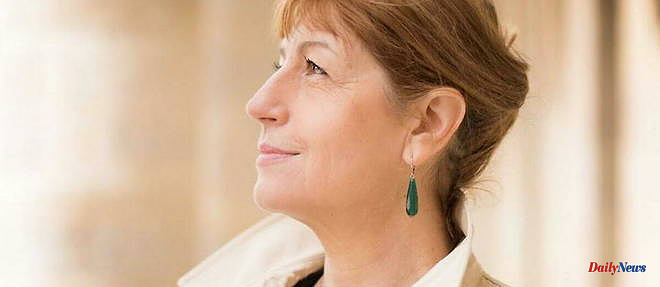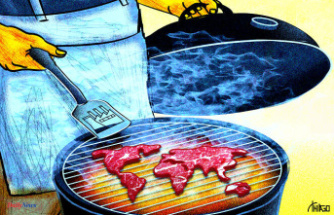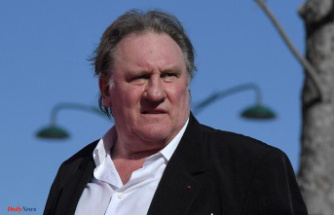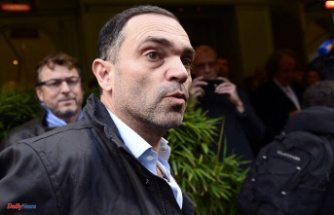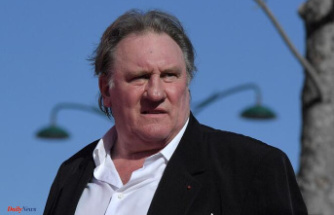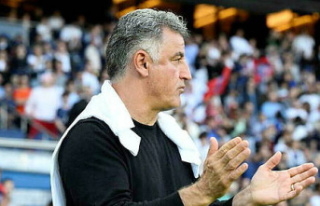Specialist in the Bronze Age, Anne Lehoërff has multiplied for twenty years the publications which modify our way of apprehending prehistory. While she is organizing, on June 6 and 7, the first scientific meetings of French archaeology*, sponsored by the Ministry of Culture and hosted by the Académie des Inscriptions et Belles Lettres, she is also publishing an enlightening book** on the issues currently facing his discipline.
She evokes both the redefinition of the notion of heritage and the question of the treatment of human remains exhumed during excavations, but also the fate to be reserved for objects inherited from the colonial past of France. Interview.
Le Point: Why organize a major colloquium on archeology today?
Anne Lehoërff: This unprecedented meeting is part of the missions of the National Council for Archaeological Research (CNRA) which I chair on behalf of the Ministry of Culture. This body brings together some thirty-five personalities representing the diversity of institutions and professionals working in archaeology. The Council must carry out a fundamental reflection on discipline. In this capacity, he produced, among other things, a framework text for all of French archaeology: the National Program for Archaeological Research.
From this text emerge concerns and themes shared by all professionals in the sector. These subjects resonate with society's expectations, such as the transmission of knowledge and the sharing of knowledge, environmental issues, the preservation of data... After accompanying this document, I found it useful that we meet to discuss these major challenges.
No. We make recommendations on the themes and/or periods to dig into. The excavations carried out in France are fixed under the legislation (that of the Heritage Code) by central and decentralized services of the State: at the level of the Drac and the regional services of archeology. For preventive excavations, there is the additional constraint of a schedule of development sites conducted throughout the territory by public or private developers.
What topics will you cover during the two days of discussions taking place at the Institut de France?
Our round tables and conferences will cover many themes... We will deal with the major scientific issues of our discipline, consider prospects for tomorrow. Some subjects are sensitive: such as the question of the treatment to be given to human remains exhumed during excavations or the fate to be reserved for objects inherited from France's colonial past. On these issues, the actors of archeology must dialogue to adopt common practices.
On these issues, what position do you take?
It is not my opinion that counts but the interest of the research to be reconciled with ethical imperatives. Each file is settled on a case-by-case basis.
There will be many. For example, we will address questions of the perimeters of archeology (which is not limited to finding). We will talk about the preservation of data (non-renewable in archaeology), international practices and expertise. We will also discuss the question of sorting to answer a recurring question: "what should we keep and how?" “Today, we archive everything with the idea that the evolution of science will make it possible tomorrow to discover, in the unearthed remains, important information.
As shown by the progress of paleogenetics. But can we really preserve everything when we have invented mass archeology and the production of archives of the ground next to it? Our colleagues who manage the written archives have had to face these questions and have opted for solutions allowing them to choose rather than submit. Perhaps we should learn from their methods.
Does this mean that practices will evolve after these meetings?
The reflection will, in any case, progress. But the event will also be an opportunity for a very diverse archeology to meet, discuss and meet eyes. The ambition is therefore twofold: that of science and knowledge, on the one hand, within an archeology itself which constitutes a key field of research in the humanities and environmental sciences; that of the close and essential links between archeology and today's society, on the other hand.
Around 4,000 professionals, spread across France and abroad. The general public often knows those of the National Institute for Preventive Archaeological Research (Inrap) but more rarely those who work in local structures, sometimes private, and in all local authorities. And then, of course, there is the academic world, the universities, the CNRS researchers. These meetings are an opportunity for dialogue between these researchers from all walks of life and an opportunity to make them better known.
You have ensured that the panels are strictly equal...
I wanted these conferences to be a meeting that made room for feminine words in a world that remained, despite progress, very masculine.
There is a real public enthusiasm for archaeology. What do you attribute it to? Indiana Jones Syndrome?
The success of this film translates the fascination that we all feel in front of this idea that our past is buried under our feet and that it is enough to dig to make it re-emerge. But I think the public interest in science in general reflects a strong thirst for knowledge among our fellow citizens. An appetite that today meets the conviction of the scientific community that knowledge must be shared with as many people as possible.
The university of CY Cergy Paris University has entrusted you, in 2021, with the first French chair dealing with both archeology and heritage. A subject that is at the center of your latest book**. How does archeology change our understanding of heritage issues?
Archeology has upset many of our knowledge by allowing us to write on the basis of new elements of important pages of our history. This discipline has also opened our eyes to the fact that human history does not wait for the invention of writing. For a long time, we considered that only the societies that gave us stories were part of history. If that were the case, then 99% of human history would have to be excluded. The studies of archaeological remains allow us to write other chapters and it is simply fabulous.
I would add that archeology is rich in lessons for our contemporary times because it offers a long-term perspective. At a time of major concerns in the field of the environment, it is not uninteresting to look at how our distant ancestors coped with climate change.
You are a specialist in the Bronze Age. What can this period teach us about our time?
Ever since I was in college, I've told myself to be humble. We are part of a very long, complex, nuanced history. For my part, I first looked at protohistoric metallurgy and realized how much we who think we are modern must bow to the sophistication of ancient techniques. I am currently studying breastplates that are approximately 3,000 years old. They are extraordinary. I work with an exceptional bronze craftsman to try to find the gestures of the craftsmen of the Bronze Age. Their techniques are impressive.
When you are passionate, like me, for archaeometallurgy, you inevitably fall, at one time or another, on weapons. This actually led me to think about violence in prehistoric societies. When we see the first swords appear, around 1600 years before our era, we can not help but think that human society is experiencing, at that time, a turning point.
That's to say ?
Violence has probably always existed. But, until then, we had not considered it useful to develop an object solely dedicated to combat. These swords mark the start of an arms race that continues today.
You note that this warlike invention was not made in the Middle East as one might think. Where are the first swords invented?
No. The Middle East is not the only cradle of war. For Europe, it is on the side of the Scandinavian countries that we find the oldest metal weapons. It is often believed, wrongly, that everything is born in the East. Perhaps because of the adage "Ex oriente lux"...
On a more peaceful note, you have also studied the history of navigation extensively. Tell us.
I came here by chance, but being the daughter and granddaughter of a long-distance sailor (Anne Lehoërff was born in Saint-Malo, editor's note), is it really a coincidence? As a professor in Lille, I had the opportunity to lead a European program on the first cross-Channel relations, setting out to discover in 1992, in Dover, one of the oldest boats used to cross the Channel around 1550 BC. Our era. It was a great collective experience.
Over 3,500 years ago!
Yes. The dating of this 18-meter long craft has proven that there was significant cross-Channel trade in 1500 BCE. It is these discoveries at human height, more than those of great monuments, that touch me. I can't help wondering how these men and women who look like us lived. Far from the Egyptian pyramids and ancient temples, our ancestors developed remarkable techniques and means from those remote times. This reinforces my idea that there are no large and small civilizations.
*The Scientific Meetings of French Archaeology, in France and abroad will be held on June 6 and 7 at the Institut de France. These conferences on the major issues of archeology are open to all by registration: here.
**Bringing heritage into the world. Archeology in action, by Anne Lehoërff, Le Pommier editions, 131 pages, 15 euros.

